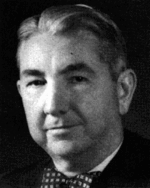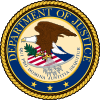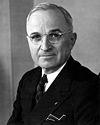- Tom C. Clark
-
Tom C. Clark 
Associate Justice of the United States Supreme Court In office
August 19, 1949[1] – June 12, 1967Nominated by Harry Truman Preceded by Frank Murphy Succeeded by Thurgood Marshall 59th Attorney General of the United States In office
June 27, 1945 – July 26, 1949President Harry Truman Preceded by Francis Biddle Succeeded by J. Howard McGrath Personal details Born September 23, 1899
Dallas, TexasDied June 13, 1977 (aged 77)
New York CityAlma mater University of Texas School of Law Religion Presbyterian [2] Military service Service/branch United States National Guard Unit Texas Thomas Campbell Clark (September 23, 1899 – June 13, 1977) was United States Attorney General from 1945 to 1949 and an Associate Justice of the Supreme Court of the United States (1949–1967).
Contents
Early life and career
Clark was born in Dallas, Texas to Virginia Maxey Falls and William Henry Clark.[3] A graduate of Dallas High,[4] he served as a Texas National Guard infantryman in 1918; afterward he studied law, receiving his law degree from the University of Texas School of Law in 1922. He was a brother of Delta Tau Delta fraternity, and later served as their international president. He set up a law practice in his home town of Dallas from 1922 to 1937, but resigned from private practice for a period to serve as civil district attorney for the city from 1927 to 1932.[5]
Clark, a Democrat, joined the Justice Department in 1937 as a special assistant to the U.S. attorney general for war risk litigation.[5] He served as civilian coordinator for the forced relocation of Japanese-Americans during the opening months of World War II. He headed the antitrust division at Justice in 1943, and the criminal division from 1943 to 1945.[5]
Attorney General and Supreme Court Justice
Appointed Attorney General by President Harry Truman in 1945, Clark was nominated to the Court on August 2, 1949, filling the vacancy left by the death of Frank Murphy. See, Harry S. Truman Supreme Court candidates. The New York Times called Clark "a personal and political friend [of Truman's] with no judicial experience and few demonstrated qualifications."[6] Nevertheless, Clark was confirmed by the United States Senate on August 18, 1949, receiving his commission the following day.[5]
Truman later came to regret his choice; he remarked to a biographer many years later that "Tom Clark was my biggest mistake."[7][8] The change in Truman's attitude stemmed from Clark's vote to strike down as unconstitutional Truman's seizure of the nation's steel mills to end a strike in 1952's Youngstown Sheet & Tube Co. v. Sawyer.
Justice Murphy, Clark's predecessor, had made a 5 to 4 majority on the Supreme Court for those justices who viewed the Court as a possible instrument of social change.[9] But Clark, along with Truman's other conservative appointees, would change that.[9] While on the Supreme Court, Clark was generally a conservative who nonetheless proved a key vote in some Warren Court cases expanding the scope of individual rights. He is noted for writing the majority opinion in the landmark cases Mapp v. Ohio, applying the Fourth Amendment "exclusionary rule" to the states, and Abington School District v. Schempp, invalidating daily Bible readings in public schools. Clark supported the end of racial segregation, joining the unanimous decisions in Brown v. Board of Education and Sweatt v. Painter.
Later life
 Clark in the Oval Office in 1967 after retiring from the Supreme Court.
Clark in the Oval Office in 1967 after retiring from the Supreme Court.
Clark assumed senior status, effectively retiring from the Supreme Court, on June 12, 1967.[5] He did so to avoid a conflict of interest when his son, Ramsey Clark, was appointed Attorney General. He was succeeded on the Court by Thurgood Marshall. Lyndon Johnson was said[according to whom?] to have appointed Ramsey Clark as Attorney General precisely to force Tom Clark off the bench, leaving a vacancy so that LBJ could appoint Marshall as the first African-American Justice on the Supreme Court. After Clark's retirement he served as a visiting judge on several U.S. Courts of Appeals,[10] as director of the Federal Judicial Center, and as Chair of the Board of Directors for the American Judicature Society.[5]
Clark died in New York City and is buried in Restland Memorial Park, Dallas, Texas. Tom C. Clark High School of the Northside Independent School District of San Antonio, Texas is named in honor of him. Also named after him is the Tom C. Clark Building, an office building of the Texas Judiciary in Austin. His former law clerks honored him by creating the Tom C. Clark award given to the outstanding Supreme Court Fellow each year. Winners of this award include Professor Robert George, McCormick Professor of Jurisprudence at Princeton University, and Professor Barbara A. Perry, Senior Fellow at the University of Virginia's Miller Center of Public Affairs and former Carter Glass Professor of Government at Sweet Briar College. In 1977, Clark became the first recipient of the Distinguished Jurist Award at Mississippi State University.[citation needed]
An extensive collection of Clark's papers, including his Supreme Court files, is housed at the University of Texas in Austin. The law school also maintains the "Tom C. Clark" fellowship, entitling selected students with a sizable tuition subsidy. The main student lounge in the school is named after Clark as well. A smaller collection, primarily relating to Clark's years as Attorney General, is located at the Harry S. Truman Library in Independence, Missouri.
Clark became an Eagle Scout in 1914 and was a recipient of the Distinguished Eagle Scout Award.[11]
Clark was a member of Delta Tau Delta International Fraternity and served as the fraternity's International President from 1966 to 1968.[citation needed]
Justice Clark's personal papers, consisting of 524 linear feet (869 boxes, 20 scrapbooks, around 1,000 photographs, and approximately 100 oversize items) are in the care of the University of Texas School of Law.[12]
See also
- List of U.S. Supreme Court Justices by time in office
- United States Supreme Court cases during the Vinson Court
- United States Supreme Court cases during the Warren Court
Footnotes
- ^ "Federal Judicial Center: Tom C. Clark". December 12, 2009. http://www.fjc.gov/servlet/tGetInfo?jid=444. Retrieved December 12, 2009.
- ^ http://www.adherents.com/adh_sc.html
- ^ Ancestry of Ramsey Clark
- ^ Rumbley, Rose-Mary. A Century of Class. Austin TX: Eakin Press, 1984.
- ^ a b c d e f Biography of Tom C. Clark from the Federal Judicial Center.
- ^ Eisler, Kim Isaac (1993). A Justice for All: William J. Brennan, Jr., and the decisions that transformed America. New York: Simon & Schuster. p. 76. ISBN 0-671-76787-9.
- ^ Bowles, Nigel. The Government and Politics of the United States (2 ed.). p. 191.
- ^ Miller, Merle (1973). Plain Speaking: An Oral Biography of Harry S. Truman. Berkeley Publishing Company. pp. 225–226. ISBN 399112618. "Tom Clark was my biggest mistake. No question about it. … It's just that he's such a dumb son of a bitch."
- ^ a b Eisler, 76
- ^ See, e.g. Bracey v. Herringa, 466 F.2d 702 (7th Cir. 1972)
- ^ "Presidents Park: Boy Scout Memorial". National Park Service. http://www.nps.gov/whho/planyourvisit/explore-the-southern-trail.htm#CP_JUMP_100807. Retrieved November 18, 2007.
- ^ Guide to the Papers of Justice Tom C. Clark at the Tarlton Law Library The University of Texas School of Law online archive
References
- University of Texas biography
- Tom C. Clark at the Biographical Directory of Federal Judges, a public domain publication of the Federal Judicial Center.
Further reading
- Abraham, Henry J., Justices and Presidents: A Political History of Appointments to the Supreme Court. 3d. ed. (New York: Oxford University Press, 1992). ISBN 0-19-506557-3.
- Cushman, Clare, The Supreme Court Justices: Illustrated Biographies,1789–1995 (2nd ed.) (Supreme Court Historical Society), (Congressional Quarterly Books, 2001) ISBN 1-56802-126-7; ISBN 978-1-56802-126-3.
- Frank, John P., The Justices of the United States Supreme Court: Their Lives and Major Opinions (Leon Friedman and Fred L. Israel, editors) (Chelsea House Publishers: 1995) ISBN 0-7910-1377-4, ISBN 978-0-7910-1377-9.
- Gronlund, Mimi Clark (2010). Supreme Court Justice Tom C. Clark: A Life of Service. Austin, TX: University of Texas Press. pp. 328. ISBN 0292719906.
- Martin, Fenton S. and Goehlert, Robert U., The U.S. Supreme Court: A Bibliography, (Congressional Quarterly Books, 1990). ISBN 0-87187-554-3.
- Urofsky, Melvin I., The Supreme Court Justices: A Biographical Dictionary (New York: Garland Publishing 1994). 590 pp. ISBN 0-8153-1176-1; ISBN 978-0-8153-1176-8.
- Wohl, Alexander, "Mapp v. Ohio Turns 50 -- If a moderate Texan could love the exclusionary rule, why can't judicial conservatives?" Slate, June 7, 2011.
External links
- Guide to the Papers of Justice Tom C. Clark at the Tarlton Law Library The University of Texas School of Law online archive
- Oral History Interview with Tom Clark, from the Lyndon Baines Johnson Library
Legal offices Preceded by
Francis BiddleUnited States Attorney General
Served under: Harry S. Truman
1945–1949Succeeded by
J. Howard McGrathPreceded by
Frank MurphyAssociate Justice of the Supreme Court of the United States
August 19, 1949 – June 12, 1967Succeeded by
Thurgood MarshallUnited States Attorneys General Randolph • Bradford • Lee • Lincoln • Breckinridge • Rodney • Pinkney • Rush • Wirt • Berrien • Taney • Butler • Grundy • Gilpin • Crittenden • Legaré • Nelson • Mason • Clifford • Toucey • Johnson • Crittenden • Cushing • Black • Stanton • Bates • Speed • Stanbery • Evarts • Hoar • Akerman • Williams • Pierrepont • Taft • Devens • MacVeagh • Brewster • Garland • Miller • Olney • Harmon • McKenna • Griggs • Knox • Moody • Bonaparte • Wickersham • McReynolds • Gregory • Palmer • Daugherty • Stone • Sargent • W D Mitchell • Cummings • Murphy • Jackson • Biddle • T C Clark • McGrath • McGranery • Brownell • Rogers • Kennedy • Katzenbach • W R Clark • J N Mitchell • Kleindienst • Richardson • Saxbe • Levi • Bell • Civiletti • Smith • Meese • Thornburgh • Barr • Reno • Ashcroft • Gonzales • Mukasey • Holder
Cabinet of President Harry S. Truman (1945–1953) Vice President None (1945–1949) • Alben W. Barkley (1949–1953)
Secretary of State Edward Stettinius, Jr. (1945) • James F. Byrnes (1945–1947) • George Marshall (1947–1949) • Dean Acheson (1949–1953)Secretary of War Secretary of Defense James Forrestal (1947–1949) • Louis Arthur Johnson (1949–1950) • George Marshall (1950–1951) • Robert A. Lovett (1951–1953)Secretary of the Treasury Attorney General Francis Biddle (1945) • Tom C. Clark (1945–1949) • J. Howard McGrath (1949–1952) • James P. McGranery (1952–1953)Postmaster General Secretary of the Navy James Forrestal (1945–1947)Secretary of the Interior Secretary of the Agriculture Secretary of Commerce Henry A. Wallace (1945–1946) • William Averell Harriman (1946–1948) • Charles W. Sawyer (1948–1953)Secretary of Labor Categories:- Truman Administration cabinet members
- 1899 births
- 1977 deaths
- American Presbyterians
- American prosecutors
- Distinguished Eagle Scouts
- People from Dallas, Texas
- Texas lawyers
- United States Supreme Court justices
- United States federal judges appointed by Harry S. Truman
- United States Attorneys General
- University of Texas School of Law alumni
Wikimedia Foundation. 2010.



